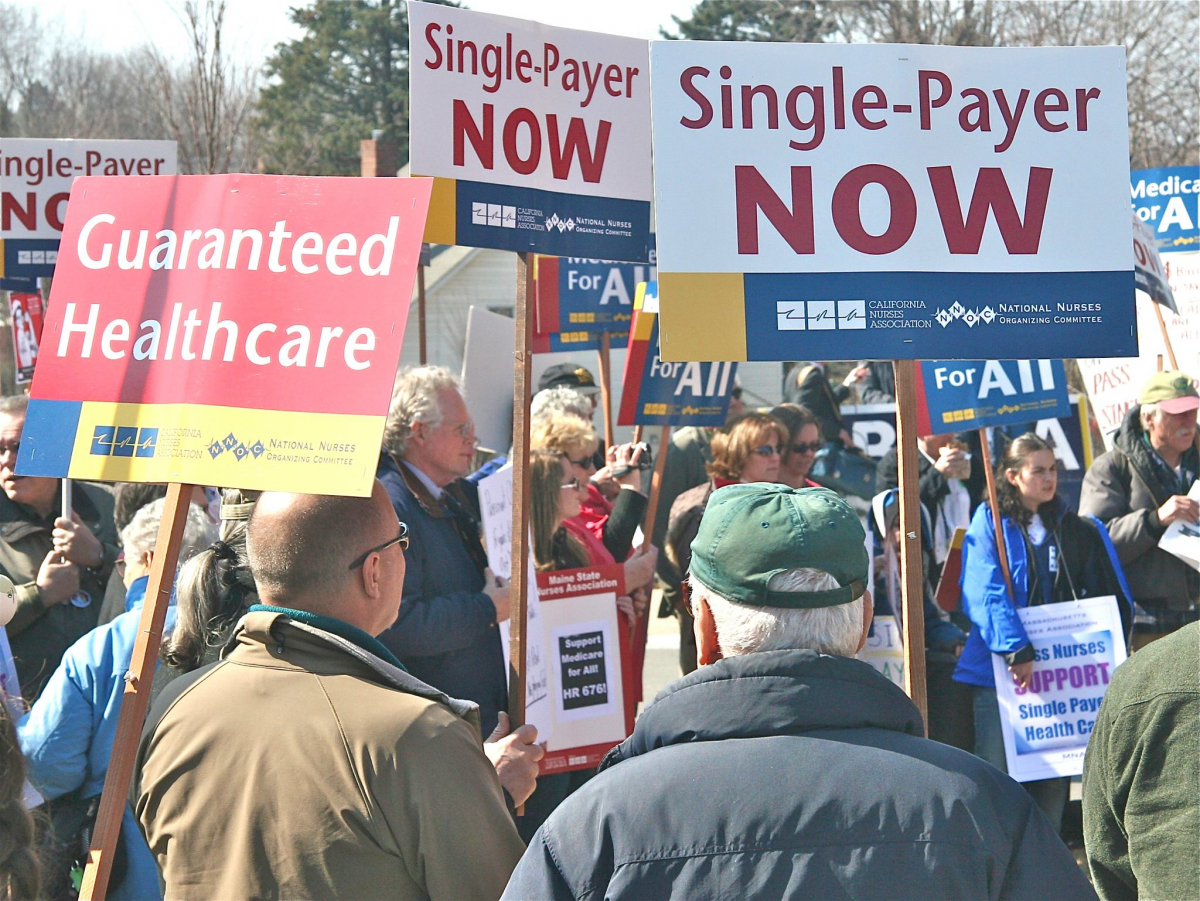This Shopping Is No Fun

Whether we like it or not, every December Labor Notes staffers get a firsthand look at how the new state health insurance exchanges are working. Photo: Single Payer New York
Whether we like it or not, every December Labor Notes staffers get a firsthand look at how the new state health insurance exchanges are working.
I’ve had four different health plans in about three years here. After our old plan was discontinued with the advent of the Affordable Care Act, we had to switch to an inferior plan, bought through the exchange.
Then, two years in a row, we got a letter announcing a dramatic price hike—by 36 percent in 2015, and 28 percent this year—forcing us to scramble to change plans to keep premiums down.
Each time, our out-of-pocket costs and deductibles went up. I’m lucky to work at an organization that’s committed to covering the increased costs. Elsewhere, it would have meant a pay cut.
I wondered what we were doing wrong. But as I recently read in the New York Times, we’re doing it right. Consumers bouncing between plans isn’t a bug of Obamacare—it’s a feature. This is how the system was designed to work.
We’re told choice gives us control. Don’t like the product? Rates too high? Go shopping. Competition is supposed to bring out the best in insurers. But in our experience, the plans get worse and worse.
And for patients, changing plans is extremely disruptive. What if you’re in the middle of a treatment or therapy? Your doctor or hospital might be not covered by your new plan. But hey, you will get a doctor, as an insurance company customer service rep assured me.
PICK YOUR POISON
This is what you get when you treat essential services like consumer products.
Public education has already caught privatization fever. Parents frustrated with their local underfunded, overstressed school are offered “school choice.” To discover the deficiencies of their school (and teachers), they’re invited to pore over data gathered by for-profit standardized testing companies.

SUPPORT LABOR NOTES
BECOME A MONTHLY DONOR
Give $10 a month or more and get our "Fight the Boss, Build the Union" T-shirt.
Don’t like what you see? Go shopping. Charter schools fill the void, with glossy color ads that promise graduation is guaranteed. Virtual charters (that’s right, kids stay home and learn on a computer) advertise on cereal boxes and morning cartoons.
But despite the ads, it’s charters choosing students, not the other way around. Enrollment guidelines are strict, and kids with low test scores or learning challenges are liable to end up on a “Got to Go” list, to be pushed out before they drag down the stats.
What happens to students whose education is handed over to fly-by-night hucksters? The Center for Media and Democracy identified 2,000 charter schools in 15 years that closed down because of mismanagement, corruption, or regulatory intervention.
Meanwhile, public schools close to make way for charters. In Chicago 50 schools were shuttered in a single year; in Philadelphia, 23. The displaced students get shuffled around. Chicago’s South Side now has areas with no neighborhood schools at all.
Studies show this disruption harms kids. It lowers graduation rates and increases inter-neighborhood tensions, even increasing youth incarceration.
HOW ABOUT CONSISTENCY?
Maybe what students and parents really need isn’t “choice” but consistency: well-funded, well-staffed public schools in every neighborhood.
And in health care, I like choosing my doctor, but I can’t say I’ve been thrilled with the experience of “choosing” my health insurance. I’d rather have some guarantee of continuity in price and coverage.
There’s no doubt the Affordable Care Act made important advances by expanding Medicaid, getting rid of exclusions for preexisting conditions, and creating plans for people who don’t have the option of employer-paid insurance.
But it’s hard to praise a system that’s designed to create havoc and disruption for the people who use it. We’re still at the mercy of for-profit insurers. Wouldn’t single-payer make more sense?


![Eight people hold printed signs, many in the yellow/purple SEIU style: "AB 715 = genocide censorship." "Fight back my ass!" "Opposed AB 715: CFA, CFT, ACLU, CTA, CNA... [but not] SEIU." "SEIU CA: Selective + politically safe. Fight back!" "You can't be neutral on a moving train." "When we fight we win! When we're neutral we lose!" Big white signs with black & red letters: "AB 715 censors education on Palestine." "What's next? Censoring education on: Slavery, Queer/Ethnic Studies, Japanese Internment?"](https://www.labornotes.org/sites/default/files/styles/related_crop/public/main/blogposts/image%20%2818%29.png?itok=rd_RfGjf)


